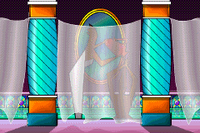| Mario is Missing! (PC) / Mario is Missing! (SNES) / Mario is Missing! (NES)
|
| Characters
|
Amsterdam mayor • Bowser • Boy • Curator • Dino-Rhino • Donkey Kong • Iggy Koopa • Larry Koopa • Ludwig von Koopa • Luigi • Mario • Mayor A. Cheever • Mayor Bernstein • Mayor Cellout • Mayor Chasen • Mayor Cook • Mayor Devotegetter • Mayor Froobnitz • Mayor Grenewetzki • Mayor Griffeath • Mayor Ima Worrywart • Mayor I. V. Gottserve • Mayor Kotzenberg • Mayor Laabs • Mayor Lan Slide • Mayor Linguine • Mayor L. S. Ismore • Mayor McCarthy • Mayor McChan • Mayor Munchkins • Mayor O. K. Leeder • Mayor Schmutznikov • Mayor Sidley • Mayor Singer • Mayor Smallburg • Monty Mole • Police officer • Princess Toadstool • Reporter • Roy Koopa • Scientist • Toad • Toronto mayor • Tourist • Wendy Koopa • Yoshi
|
| Enemies
|
Koopa • Pokey
|
Cities,
landmarks
and items
|
Amsterdam
|
Aalsmeer Flower Market (Tulip from the Aalsmeer Flower Market) • Rembrandt's House (Rembrandt's paintbrush) • Amsterdam Diamond Center (Diamond) • Canal (Canal Boat steering wheel)
|
| Athens
|
Erechtheion Temple (Caryatid) • Hadrian's Arch (Brass Plaque) • Parthenon (Parthenon Column) • Presidential Palace (Foustanella)
|
| Beijing
|
Forbidden City (Gate of Heavenly Peace) • Great Wall of China (Stone from the Great Wall) • Temple of Heaven (Hall of Good Harvest) • Tian An Men Square (Monument to the People's Heroes)
|
| Berlin
|
Berlin Wall (Brick from the Berlin Wall) • Brandenburg Gate (Brandenburg Gate Horseshoe) • Charlottenburg Palace (Sophie Charlotte's Crown) • Unter der Linden Street (Unter der Linden park bench)
|
| Bombay
|
Elephanta Caves (Statue of Shiva) • Gateway of India (Indian Flag) • Victoria Terminus (Train Ticket from Victoria Terminus)
|
| Buenos Aires
|
Gaucho Museum (Boleadoras) • Obelisk Monument (Stone from the Obelisk) • Teatro Colon (Flute from the Teatro Colon)
|
| Cairo
|
Great Pyramid (Top Brick of the Great Pyramid) • Mosque of Mohammed Ali (Gingerbread Clock) • Sphinx (Klaft of the Sphinx) • Tomb of King Tutenkhamen (King Tut's mask)
|
| Dublin
|
Guinness Brewery (Guinness Beer Label) • O'Connell Street Lamppost (Lamppost Shamrock) • Statue of G.B. Shaw (Beard from the G.B. Shaw statue) • Trinity College Library (Irish Harp)
|
| Istanbul
|
Blue Mosque (Blue Mosque tile) • Galata Bridge (Turkish Flag) • Topkapi Museum (Turkish towel from the Harem Baths)
|
| Jerusalem
|
Damascus Gate • Dome of the Rock • Shrine of the Book (Dead Sea Scrolls) • Western Wall (Western Wall brick)
|
| Kathmandu
|
Asan Tole (Rickshaw) • Balaju tank (Reclining Vishnu) • Toothache Tree (Toothache Tree Nail)
|
| London
|
10 Downing Street (Door to 10 Downing Street) • Big Ben (Big Ben's minute hand) • Buckingham Palace (Guard's bearskin hat) • Tower of London (Crown Jewels) • Westminster Abbey (Bust of Shakespeare)
|
| Madrid
|
Prado Museum (Guernica) • Spanish Parliament (Lion's Tail from the Parliament) • Ventas Bullring (Matador's Cape)
|
| Marrakech
|
Jemaa-el-Fna Marketplace (Cobra) • Koutoubia (Gold Globe) • Ourika Camel Market (Camel Saddle) • Saadian Tombs (Carved Tile)
|
| Mexico City
|
Angel of Independence • Fine Arts Palace (Fine Arts catalog) • National Palace (Diego Rivera Mural) • Pyramid of the Sun (Top of the Pyramid) • Zocalo (Mexican tile)
|
| Montreal
|
Mount Royal (Important stone) • St. Joseph's Oratory (Dome of St. Joseph's Oratory) • Olympic Stadium (Tilted Tower)
|
| Moscow
|
Bolshoi Ballet (Bolshoi Ballet slipper/Bolshoi Ballet Tutu) • Kremlin (Cannonball from the Emperor's Cannon/Emperor's Bell) • Lenin's Tomb (Guard's hat pin) • Moscow Metro (Moscow Metro M) • St. Basil's Cathedral (Cathedral Dome)
|
| Nairobi
|
Kenyatta Conference Center (Revolving restaurant menu) • Maasai village (Maasai Headdress) • Nairobi National Park (Baby elephant) • National Museum of Kenya (Human skull)
|
| New York City
|
Empire State Building (King Kong) • Radio City Music Hall (Rockette) • Rockefeller Center (Statue of Prometheus) • Statue of Liberty (Statue of Liberty Torch) • United Nations Plaza (U.S. Flag)
|
| Paris
|
Arc de Triomphe (Eternal Flame) • Cathedral of Notre Dame (Notre Dame Bell) • Eiffel Tower (Tricolor) • Louvre (Mona Lisa)
|
| Rio de Janeiro
|
Carnival (Carnival headdress) • Christ the Redeemer Statue (Spotlight from Christ the Redeemer Statue) • Copacabana Beach (Copacabana beach seashell) • Maracana Stadium (Soccer Ball) • Sugar Loaf Mountain (Sugar Loaf Mountain cable car)
|
| Rome
|
Colosseum (Gladiator's spear) • Pantheon (Column from the Pantheon) • Sistine Chapel (Michelangelo's Paintbrush/Sistine Chapel ceiling) • Spanish Steps (Bannister from the Spanish Steps) • Trevi Fountain (Coins from the Trevi Fountain)
|
| San Francisco
|
Alcatraz (Striped prison shirt) • Cable Car (Cable Car Bell) • Coit Tower (Window from Coit Tower) • Golden Gate Bridge (Golden Gate Bridge fog horn) • Transamerica Pyramid (Top of the Transamerica Pyramid)
|
| Sydney
|
Bondi Beach (Surfboard from Bondi Beach) • Sydney Harbor Bridge (Steel Girder from the Harbor Bridge) • Sydney Opera House (Sydney Opera Sheet Music) • Taronga Zoo (Taronga Zoo koala)
|
| Tokyo
|
Great Buddha of Kamakura (Great Buddha's Orange) • Kabuki Theater (Mask from the Kabuki Theater) • Kokugikan Arena (Sumo Apron) • Sensoji Temple (Sensoji Temple Lantern) • Ueno Zoo (Tong Tong)
|
| Toronto
|
Canadian Mounty Station (Mounty's Hat) • Canadian National Tower (Telescope from the Canadian National Tower) • Toronto City Hall (Golden Maple Leaf from City Hall)
|
| Other
|
Globulator • Taxi token • Walkie-talkie
|
| Further info
|
Gallery • Media • Quotes • Staff
|
|
|

